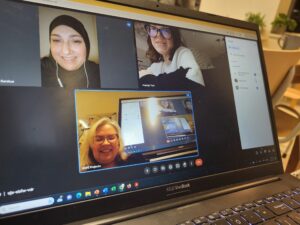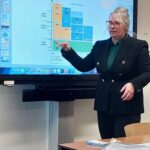Adult educator’s digital literacy
Everyone today needs to have at least basic digital skills in order to study or work, communicate, to access a growing number of online public services, and to find trustworthy information. The Digital Economy and Society Index shows that four out of ten adults in the EU lack basic digital skills. In order to respond to this priority, this handbook shows innovative methods and tools for teaching, training, and learning in the field of adult education, developing and improving the digital competencies of adult educators.
Adult education policy planning documents on digital learning, learning approach, principles working with different ages adults, learning content, main learning messages importance, and visualization should build an interactive and engaging environment through innovative methods and tools.
Digital tools will only be effective if they are used within the right frames and combined with andragogy theory. We should for instance understand that employing digital tools does not mean we need to constantly use them working with adults. The adult educator has to have digital competencies to use when it’s needed to enrich learning activities.
Adult educators team who are working in the area of digital competence focuses on adults at risk of social exclusion, particularly people on the margins, and older people who need to develop digital skills to keep their social relations and train their cognitive skills in a digital world. Adult educators working with vulnerable groups still lack digital tools which will help in involve more adults in learning process.
Improving adult educators’ digital skills will empower them to play an active role in adult education.
The pandemic situation shows that adult educators were not prepared enough to implement online digital non-formal learning. To start using ICT and to be involved in the activities through online activities was a big challenge for adult educators working with different adults. It is and was unexpected force majeure conditions that forced to use of ICT and its communication programs to reach the audience, target group (adult learners). Better use of the ICT provide significantly greater benefit to the society and increases the individual’s role in its successful development and civic democracy.
Adult educator’s ICT competencies and all accessible technological tools and approaches encourage collaborative learning by including teamwork activities, digital skills acquired working with adults and adult educators, and learning through innovative tools and methods. Adult educators’ empowerment with knowledge and practical suggestion, in order to fit the latest digital media innovations and requirements are important to the factor of digital society.



